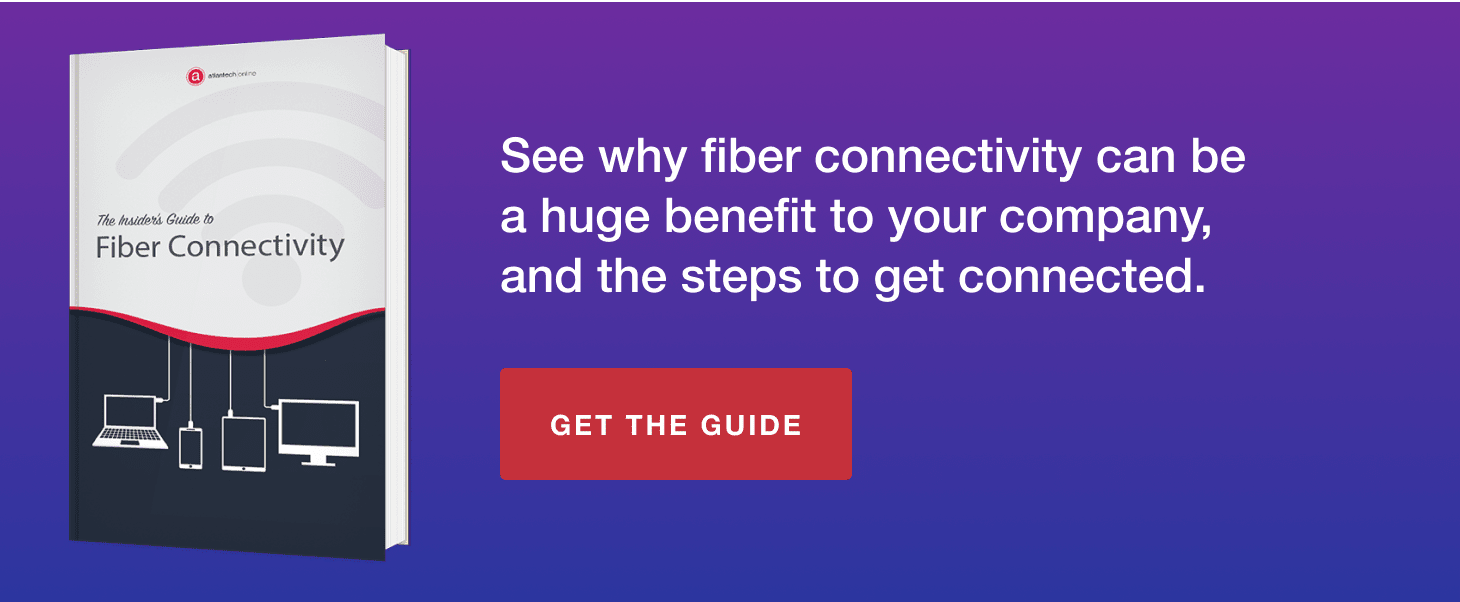Want the Best Business Internet? 8 Criteria Your ISP Should Meet

Before we talk about the best business internet, picture this: You're watching Breaking Bad when all of a sudden, you see the wheel of death. Your internet connection has gone. Having your Netflix marathon interrupted by the "frozen screen" is not how anyone wants to spend their day off.
Unreliable business internet could have serious repercussions on workforce productivity, customer service, and your customer experience, driving them away to the competition. To eliminate these issues, you need the best business internet service that you can afford.
We have more ways to communicate with our colleagues and customers than ever before, but many of those communication avenues rely on the internet. Finding the best internet service isn’t easy. Companies will shout from the rooftops about how fast and cheap their internet is, but if we dig a little deeper, what’s more important is reliability, service level, and support.
It can be tempting to sign up with the first big provider you find on a quick Google search, but smart business owners understand they need to make sure they’re getting the best business internet service at a fair price. Download and upload speeds, coverage, stability, bandwidth requirements, and security are all factors we’ll explore here.
8 Criteria Your ISP Should Meet for the Best Business Internet Service
This list is not exhaustive, but we believe these criteria are the most important things to consider when deciding who the best business internet provider is for your company. Your needs will be unique. If you need support, you don’t want to be dealing with long wait times, impersonal service, or hidden fees.
There are many benefits of having the best business internet, including:
- Better productivity. This study showed that the internet has positive and statistically significant effects on labor productivity. You can leverage better productivity leading to more sales, a better customer experience, and an all-around better work experience for your employees.
- Employee satisfaction. With less frustration due to poor internet connection, your employees can move seamlessly from task to task without losing steam.
- New, customer-friendly communication channels. Using high-quality video conferencing between your teams and with customers shows you’ve invested in the best technology to provide a better experience.
With this in mind, let’s have a look at the criteria your ISP should meet.
1. Type of High-Speed Internet
First, you need to nail down the basics:
- How fast do you need your internet connectivity to be?
- How much bandwidth do you need?
- How many devices will be connecting to the internet?
Outlining your needs will put you in a better position to compare ISPs, and will determine your best option from the following:
Cable
Cable relies on standard coax cable lines. It’s popular and affordable and is still up to the job for small teams. There is a caveat, though, and it’s worth considering if you have a big team or are based in a population-dense area. The speed might slow down in peak times because bandwidth is shared, decreasing productivity and increasing latency.
Fiber
Fiber is the gold standard and the best for businesses. It offers equal download and upload speeds (symmetrical) and superior scalability, allowing you to multiply your speed instantaneously on a day-to-day basis. It’s the most reliable of the three.
Wireless
If neither cable nor fiber is available, you may be relegated to a wireless connection. Whether it is WiFi, cellular networks, or other options such as free-space optics, wireless is less desirable as network security can be more difficult to manage, and signal interference may become a factor.
2. Location
Whenever you’re comparing internet service providers, make sure fiber service is available in your area, and crucially, whether where they are based impacts the service they provide.
You’ll need to know if the ISP you are considering has fiber access to your building. Also, keep in mind that the initial cost to install fiber might be high, but the overall cost of using fiber optic internet is lower than other methods.
Finally, local internet service providers will provide a better quality of service because there will be local experts ready to help when needed, shorter dispatch times, and easier scalability.
3. Speed
When we talk about business internet speed, it’s not about how fast your internet works, but rather how fast data moves within your available bandwidth. If you have numerous employees using the internet simultaneously, you’ll require a fast connection for a few reasons.
First, you want to avoid a noticeable slow down in performance during periods of high demand for internet access (i.e., when most or all of your employees are logged on and working).
Second, with more of the workforce potentially working remotely, heavier cloud services and video conferencing can strain your business internet connection. Hybrid workforces also need to be able to share documents quickly and efficiently.
However, be cautious when looking at the speeds providers advertise. Many companies advertise maximum speeds, not the average speed users will receive. They also do their best to hide their service level agreements on their websites (if they show them at all) to prevent potential customers from seeing the average speed users receive.
4. Bandwidth
How many employees do you have? How many devices require an internet connection? What about users (including inbound users)?
If speed is how fast data moves, bandwidth is the amount of data that can be moved.
You need to know the service provider you choose has the bandwidth necessary for the activities you need to perform, including video conferencing, large file downloads, web browsing, email, and other business-critical functions. Low bandwidth causes many issues such as slow speeds, delays, latency, and poor video conferencing quality.
Considering all of this, you need to know your provider can accommodate your bandwidth needs and whether there are charges or fees for increasing or decreasing bandwidth over time. The ideal business internet provider will offer customized bandwidth options so that you don’t pay for what you don’t use or need.
What we're seeing is an insatiable demand for more bandwidth. We're now regularly quoting 10 GigE connections and recently entered into an agreement to deliver 100 GigE! I remember back in 1996 when I worked for an ISP that had 1,500 dial-up customers and we connected them through a single T-1 circuit (1.5 Mbps!).
5. Customization
Customization is important to make sure you’re not paying for what you’re not using.
The telecom giants offer cookie-cutter plans, resulting in businesses getting more than they need and paying too much. For example, if you need 400 Mbps speed, but the telecom company only offers 100 Mbps or 1000 Mbps, you’ll either have to pay for the top tier without using everything you’re paying for or pay for subpar internet service that doesn’t meet your needs.
A customized business internet solution keeps costs down while providing you with the bandwidth and speeds your business requires.
6. Uptime
High uptime is critical. If your business internet goes down, you face loss of service, fewer sales, and customers not being taken care of.
Think about all the processes and systems you have that require an internet connection: your phone system, payment processors, online booking, email, and your website. It could be catastrophic for your business since every minute of downtime equates to an average loss of $5,600.
The solution to downtime is redundant systems. Does your provider have diverse building entries and metro fiber rings? These kick redundancies kick on when your initial system fails, allowing you to still function as a business. Does your provider include this in their service, or is there an extra cost?
When evaluating a business internet provider, ask them about their uptime availability. Uptime is written as a percentage and indicates the amount of time over the course of one year your internet service will be up and available:
- 99.9% availability = 8.77 hours of downtime in a year
- 99.95% availability = 4.38 hours of downtime in a year
- 99.99% availability = 52.6 minutes of downtime per year
- 99.999% availability = 5.26 minutes of downtime per year
These uptimes are written into service level agreements that trigger a credit to the customer’s account to compensate them for the downtime if breached by the ISP.
7. Value
We believe value stems from the best service to customers.
Going with a big telecom company may seem like the best choice. They have a larger network and more accessible customer service channels. But what they offer in size, they lack in speed and quality. Ask yourself these questions:
- Do you need an extensive national network or a high-performing, local network?
- Would you rather have access to local technicians who will fix any issues that arise?
- And do you want your issues resolved by someone in an overseas call center following a script, or would you prefer a personalized approach delivered by a local expert empowered to solve your problem through any means necessary?
With a local provider, you’ll get more knowledgeable staff, a provider who knows their customers and can therefore build quality relationships based on trust and services delivered.
8. Customer Service
Sixty-five percent of customers said they have changed to a different brand because of a poor experience. So, how are the ISPs you’re evaluating rated on independent surveys?
Big telecom giants care more about speed to market than they do about a reliable service, as demonstrated by their service departments being outsourced and understaffed. With a local company, you’ll get someone on the phone who won’t stop until they’ve resolved your issue because they care and are more invested in your success.
More importantly, when it comes to any issues with internet service, 90 percent of consumers worldwide consider issue resolution as their most crucial customer service concern.
How quickly does the ISP respond if a failure occurs? Check for field response policies and ensure they meet your business needs. Be sure to check online reviews and consumer advocacy websites to see how potential ISPs treat their existing customers.
Get the Best Business Internet in the Washington D.C. Metro Area
At Atlantech Online, we provide fiber internet to the Washington D.C. metro area, reaching speeds of up to 100 Gbps.
We’ve thought through everything above and deliberately constructed our fiber-ring-based business internet to give you everything you need without the typical headaches other providers create.
Being local means we have in-area experts ready to deliver fast support. The ones you speak to on the phone will be the ones who will come on-site to fix an issue if needed. We strive to be a business internet provider you can trust, not one you have to worry about.
If you feel like you want to know a little more about business fiber internet, download a copy of our Insider’s Guide to Internet Connectivity.


